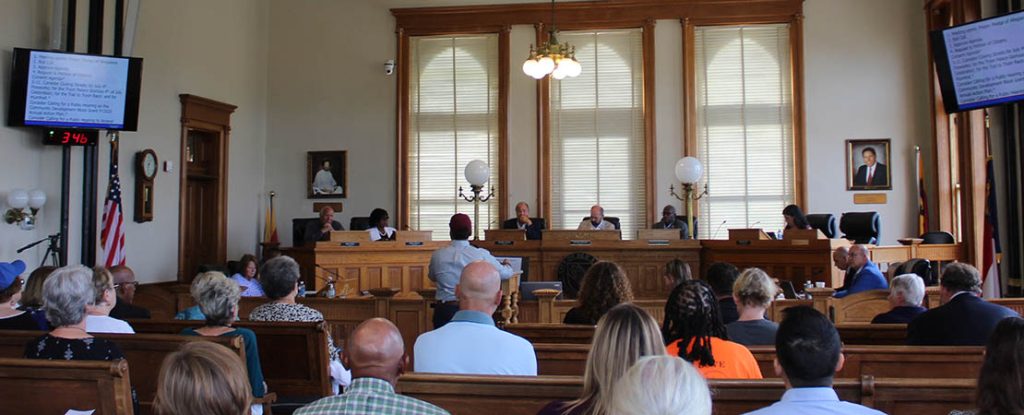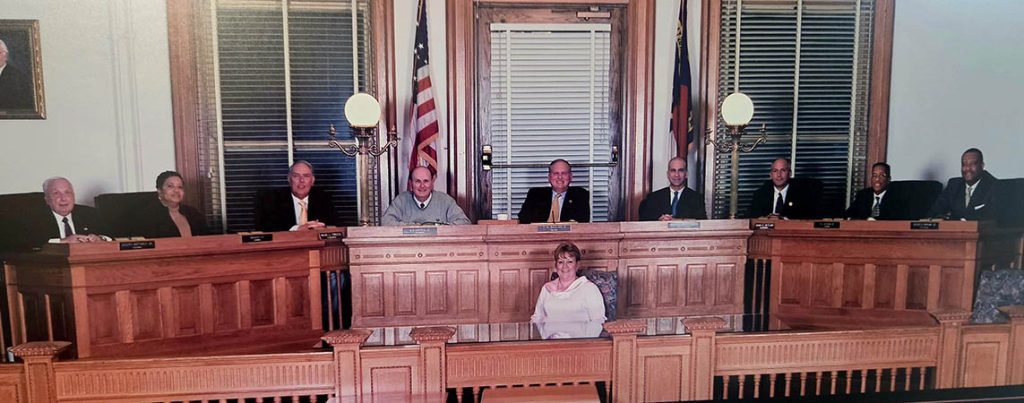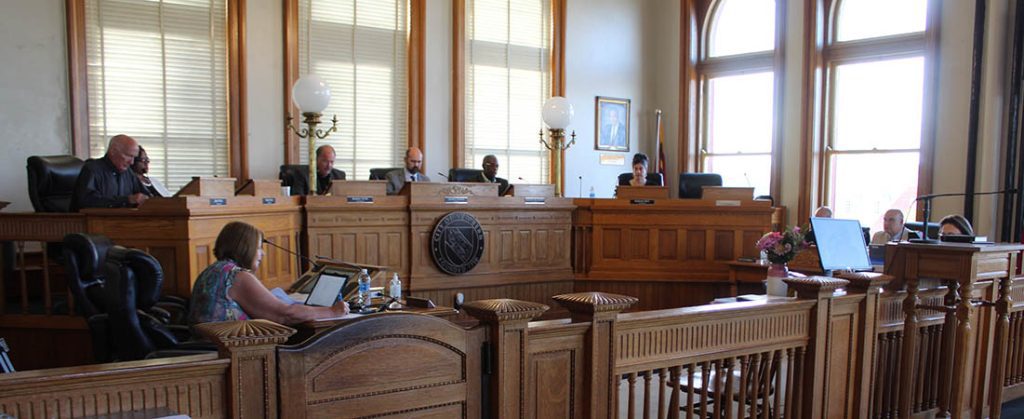
Is an old charter change decision coming back to haunt the Board of Aldermen?
New Bern’s mayor could only vote to break a tie until the June 2011 charter change gave him the right to vote on all matters before the city council, known as the Board of Aldermen. Now, the mayor is causing a tie and preventing the Board of Aldermen from appointing an alderman to the Ward 6 seat that’s been vacant for almost a year in New Bern, NC.
A closer look at the last 16 years of New Bern’s history gives us insight into how we got here.
In December 2009, New Bern’s mayor and all but one of the city council members were first-time elected officials. The longtime city manager had just retired after serving two decades and an interim manager filled the role until a new manager was hired in August 2010. The former mayor and majority of the 2005 Board of Aldermen had served several terms in office.
New Bern’s legal body is like a train
A month after the elected officials came into office, A. Flemming Bell, professor of Law at the University of North Carolina School of Government, came to New Bern and explained the roles and responsibilities of the City Council, known as the Board of Aldermen, and the mayor, according to Jan. 10, 2010 meeting minutes.
Bell used a train analogy, comparing the board and mayor to passengers on a train that’s having an endless run — they get on and off at different stops, but the train keeps moving. “The train is the council as a legal body” that was incorporated in 1710. And while some of the rules have changed, they are still the same city that was incorporated by the General Assembly before the Revolutionary War.
Who’s in charge?
New Bern has a council-manager form of government, according to the city charter which defines the organization, functions, powers and procedures of the city’s government.
The voters of each of New Bern’s six wards elect one alderman to represent the ward. The six-member Board of Aldermen collectively vote to decide local issues, oversee the general operation of the city and approve the budget.
The city manager carries out the policies and laws, runs the day-to-day operations, has the authority to hire and fire employees and takes direction from the Board of Aldermen.
New Bern’s mayor is elected at large as the ceremonial head of the city, presides at aldermen meetings and makes appointments to the Housing Authority of the City of New Bern’s public body.
The city attorney advises the city; the city clerk keeps records of meetings, maintains records, performs other duties and takes direction from the city manager; and the finance director plans, organizes, directs the financial management functions of the city and receives direction from the Board of Aldermen.
Board of Aldermen to act by majority vote
Professor Bell said it is important that the Board of Aldermen adopt rules and procedures as the rules allow all members to have a shared understanding of their responsibilities and the decision-making process.
Bell said the whole system of our democracy is for the Board of Aldermen to act by a majority vote, which is the basic premise of the legal system. The board collectively votes to take action.
That does not appear to be the case today. In fact, the mayor has been directing the city manager to do things without having consensus from the Board of Aldermen.
Fairness is key
In 2011, Professor Bell said, “Keeping order is the mayor’s responsibility, or whoever has the gavel that night.”
He said the mayor’s role is “to provide for orderly, fair meetings where the majority rules, but the minority is heard.” The mayor is the presiding officer and has to treat everybody fairly — “make your decisions based on the merits, not on manipulating the rules.”
Bell also explained the board and mayor have to be consistent about how rules are applied; “The mayor interprets the board’s rules, but the members can appeal the mayor’s rulings to the council,” he said. “They’re still the council’s rules so, if the council wants to disagree with the mayor on an interpretation, they ought to be able to do that by majority vote,” he said.
Unfortunately, this does not appear to be the existing case – instead the mayor is vetoing the majority of the Board of Aldermen.
How did that happen?
Mayor’s power shifts from breaking a tie to causing a tie
In January 2011, the Board of Aldermen voted 3-2 to approve a resolution that led to the mayor having the right to vote on matters. This change in policy was made when one alderman was not in attendance. Historically, the mayor could only vote to break a tie. Two years later, the three alderman ran for mayor, as previously reported here.
Now, three aldermen don’t have a majority because the mayor has the right to vote on matters.
How is this fair?
Debate
In 2011, Professor Bell said it’s often considered a point of fairness, if and when, the mayor wants to get involved in the debate, they can turn the gavel to the mayor pro tem. If the mayor pro tem gets involved, then they pick another council member. If all members are involved, then they pick the manager, clerk, attorney or someone else to preside. “But the point being, you want to have fairness. Again, fairness is a key thing in a meeting.”
Professor Bell said in order to end a debate, a member must call the previous question, and the board must vote to end the debate. Ending the debate without a vote “would give too much power to one board member.”
Now, the Board of Aldermen’s rules of procedures say, “The mayor shall preside at board meetings if he or she is present, unless he or she becomes actively engaged in debate on a particular matter.” Since taking office, Mayor Jeffrey Odham has never turned the gavel over prior to debated issues.
The aldermen voted to excuse the mayor from voting to rezone land that he managed, NewBernNow.com asked why he was leading the conversation and debating the issue in 2022, City Attorney M. Scott Davis said it was because he is the chairman.
When the board was revising their rules of procedure in February 2024, Alderman Johnnie Ray Kinsey said, “I think the rotation (of voting on items) would be good for everyone because the mayor’s job is to break the tie.”
He said the (2009-2013) Board of Aldermen “changed the ordinance where the mayor could vote but the true duties (of the mayor) are just breaking the tie” and wanted to know what the board thought.
Mayor Odham debated the voting order issue without turning over the gavel. He said he changed the voting order so he would be the last one to cast a vote as it would “take the heat off” the aldermen on controversial issues.
While he debated the issue, he said, “If there ever comes a time where the mayor is the first one to vote, that gets a little bit sticky because the mayor is not really supposed to be highly engaged with the debate and starting off the notion in a certain way” and then he asked the city attorney for guidance.
Scott Davis said, “The mayor is the chairman of the meeting and is not to engage in robust discussion…If the mayor is going to actively engage in debating an issue, then the mayor would turn the gavel over to the mayor pro tem and then engage robustly in some discussion,” he said.
“In terms of speaking first or voting first, it can set the tone as to — this is what the mayor wants so everyone get in line,” the city attorney said.
Davis suggested that the board “avoid having the mayor speak first or vote first to avoid leaving the impression that the mayor’s making you do something, or the chairman of the meeting is directing the outcome.”
He said the change to the voting order would allow Odham to always be in the hot seat by casting the last vote. He said it was “quite rare, that would be the outcome, rather than putting an alderman in that spot.”
The “quite rare” situation became a reality five months later when the Ward 6 alderman resigned from office and left the citizens of the ward without an alderman to represent them.
Several attempts have been made to fill the vacant alderman seat over the last year. Every time the majority of the Board of Aldermen — currently three of five aldermen — have voted, Mayor Odham vetoed their decision and caused a 3-3 tie.
It’s become apparent that the mayor does not think the rules apply to him. He continues to speak first and debate issues without turning over the gavel and has changed the voting order to allow him to veto decisions made by the majority of the Board of Aldermen.
Is this what citizens really deserve?
That was then, this is now

A photo of the courtroom dais at New Bern City Hall from 2006 shows that the city manager, city attorney and mayor sat in the middle of the 2005-2009 Board of Aldermen. The manager and attorney seats were repositioned below the dais after the 2009-2013 Board of Aldermen took office.

A photo that was taken in May 2025 shows the Board of Aldermen with the mayor at the dais and the city manager, attorney, clerk, finance officer and assistant city manager are on the same level as the citizens.
Related news:
Candidate filing for New Bern’s 2025 municipal elections begins July 7
The candidate filing period for the October 2025 election begins on July 7 and ends on July 18 at the Craven County Board of Elections at 406 Craven St. in New Bern, NC, according to their website.
Next meeting
The Board of Aldermen will meet on July 8, 2025, at 6 p.m. in the second-floor courtroom at City Hall, 300 Pollock St. in New Bern, NC, according to the meeting agenda.
Editor’s note: The article was updated to reflect that one alderman was not a first-time elected official in 2009.
By Wendy Card, editor. Send an email with questions or comments.

